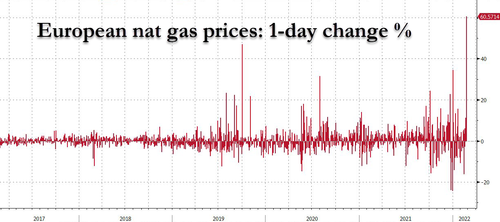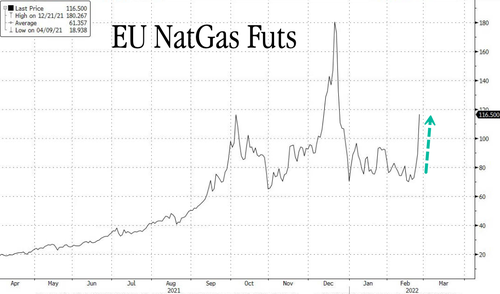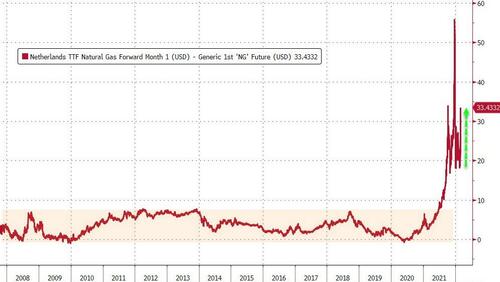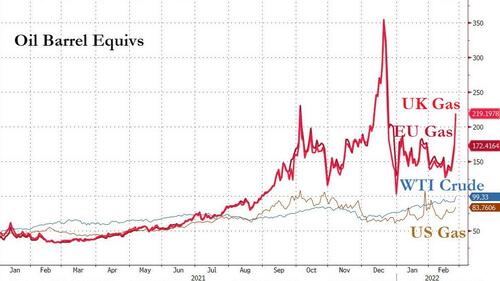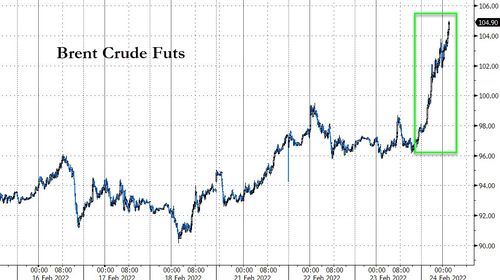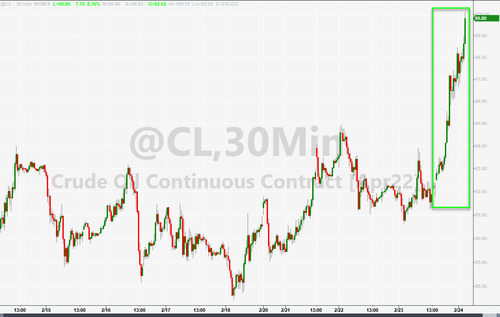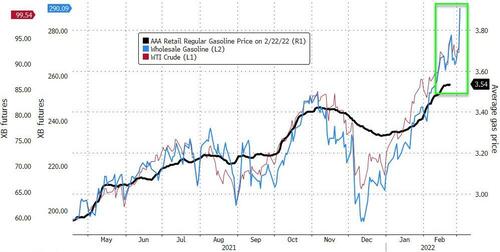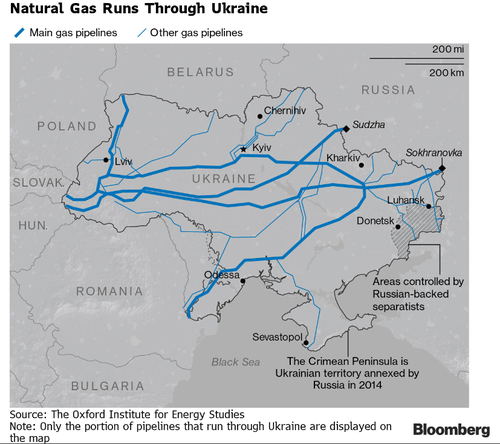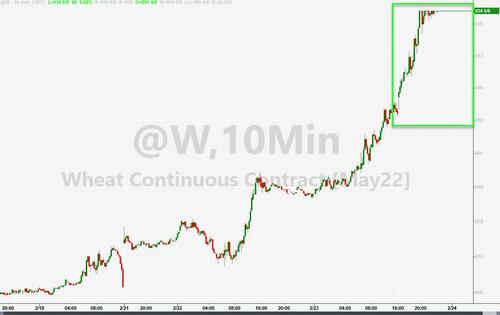By Oilprice.com
Dutch TTF Gas Futures are up a staggering 60%, the most since 2005, in their fourth consecutive daily gain.
German power contracts for March soared as much as 42%. Crude also increased, with Brent futures trading as high as $105 a barrel.
Despite the Russian invasion of Ukraine, the US is unlikely to target Russian oil in the next round of sanctions for fear energy prices would continue to skyrocket.
“I expect stringent sanctions, but nothing on energy — bankers, ships and oligarch,” Bob McNally, a former White House official who is president of consultant Rapidan Energy Group, told Bloomberg. “They don’t want to add upward pressure on oil prices — they are absolutely terrified,” McNally said.
Meanwhile, Putin’s right-hand man, Dmitry Medvedev, warned on Tuesday that Germany’s move to halt the process of certifying the Nord Stream 2 natgas pipeline would only result in soaring natural gas prices for the continent running low on supplies.
Global energy prices are soaring after Russian forces launched a barrage of artillery, airstrikes, and missiles across Ukraine early Thursday to “demilitarize” the country. Even though natural gas and crude prices jumped on Thursday, there are no reports of supply disruptions or blackouts in Ukraine, suggesting businesses as usual.
An escalation of the Russia-Ukraine conflict sent Dutch TTF Gas Futures up more than 41%, rising for the fourth consecutive day. Soaring gas prices are also feeding into power markets. German power contracts jumped as much as 31%.
The EU and US natural gas price spread is blowing out again, this time on geopolitical concerns. The spread blew out on unseasonably cold weather and low natgas supplies in late 2021.
And has lifted US NatGas prices as potential export demand is priced in…
The crisis sent Brent crude prices higher, up 8.55% to $105 a barrel. This is the first time the international benchmark for crude surpassed the $100 mark since 2014.
WTI futures topped the $100 mark…
Soaring crude prices will only mean rising gasoline prices at the pump for Americans. The move in crude suggests $4 gasoline prices are ahead as the inflation monster crushes households.
The Ukraine crisis has given the Biden administration and their media counterparts the perfect cover to blame increased gas prices, inflation, and supply-chain issues on Russia.
Europe, already in the midst of an energy crunch, is experiencing low natgas inventories ahead of the spring/summer season. Russia is a top energy supplier to Europe, supplying about a third of its gas needs. Any gas disruption would be catastrophic for the continent.
Russia is a top energy supplier to Europe, supplying about a third of its gas needs. Any gas disruption would be catastrophic for the continent.
Despite the ongoing fallout from Russia’s attack on Ukraine, Bloomberg’s Javier Blas noted, “Ukrainian gas pipeline company confirms that flows through the country (from Russia into the European Union) continue “smoothly.””
Blas said, “if nothing changes” today, “the UE, UK and US will buy in the next 24 hours ~3.5m barrels of Russian oil (crude and products) and another ~275m cubic meters of gas. At today’s prices, that’s worth >$700 million.”
He added, “for now, the biggest physical disruption to Russian / Ukrainian commodities flow **appears** to be on grains (wheat would be most affected). Shipping restrictions imposed around grain export ports.”
Soaring energy prices will only put further stress on EU lawmakers to resolve the Ukraine conflict.
“This will put further stress on the EU both on the energy side and diplomatic side,” said Thierry Bros, a professor at the Paris Institute of Political Studies.
European leaders are planning an emergency meeting on Thursday to discuss the crisis. Europe might compete with Asia for natgas should pipeline disruptions be seen.
“In the event of prolonged disruption, gas inventory couldn’t be rebuilt through the summer,” Kateryna Filippenko, principal analyst for Europe gas research at WoodMac, wrote in a note.
“We’d be facing a catastrophic situation of gas storage being close to zero for next winter. Prices would be sky-high. Industries would need to shut down. Inflation would spiral. The European energy crisis could very well trigger a global recession,” Filippenko said. Oilprice.com


